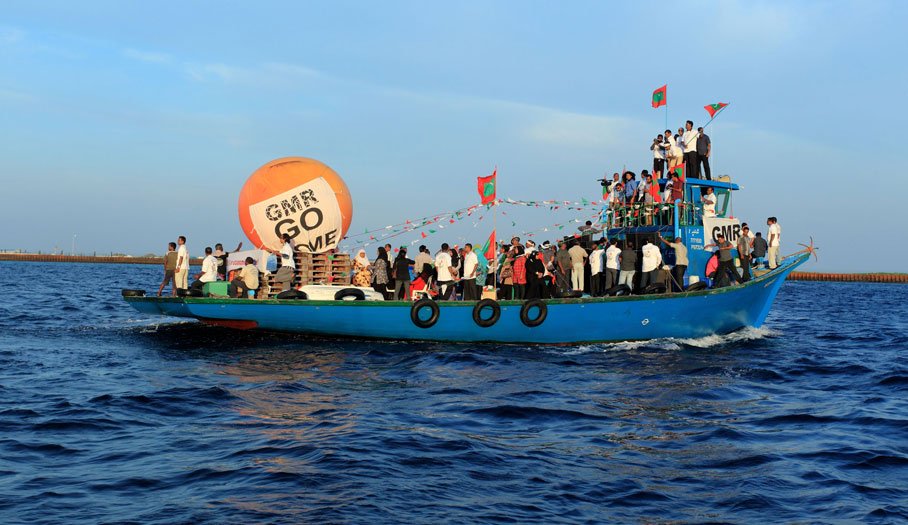The long road from Islam to Islamism: a short history
Not just about beliefs

Despite the continued proselytising for puritanical Islam, the overtly political among Maldivian Islamists have on many occasions demonstrated an astonishing willingness to sacrifice principles for power. Quite apart from participation in anti-government activities and the toppling of a legitimate government in 2012—neither of which is condoned in Islam—Adhaalath has also failed to speak against Supreme Court Justice Ali Hameed for his highly publicised fornication, a Hudd crime that Adhaalath wants everyone else sentenced to a 100 lashes for. Although it is loud in its calls for the establishment of Shari’a as the only legal system of the Maldives, it has shown absolutely no concern for the many injustices carried out by the farcical justice system currently in place. Nor has any Islamist leader spoken out against the rampant corruption at all levels of government. The ultra-nationalism which it showed towards the tumultuous end of Nasheed’s government, including whipping up pseudo-religious hate against Indian company GMR’s contract to handle the Ibrahim Nasir International Airport, appears to have been no more than a political tactic. Taking shelter behind the religious rhetoric, the government declared the US$500 million contract as ‘void ab initio’ at the potential cost of US$1.4 billion. Reports say the current Maldivian government is soon expected to award a contract to develop the same airport to Singaporean company Changi for an estimated US$800 million. Also this month it signed a contract with Chinese state-owned company Sinohydro to develop a new apron at the same airport. Not a peep out of the Adhaalath or any of the Islamists on how Islam and Maldivian identity would suffer when foreign contractors are put in charge of ‘the gateway to the Maldives’. This hypocritical pragmatism, although obvious to those who have resisted the call to fundamentalist Islam, appears to the converted as of little importance or consequence. They remain impervious to the facts in front of them: the same people who are calling them to fundamentalist Islam, or violent Jihad in conflict ridden areas of the world are themselves often deaf to what they preach, and are quite happy to remain safe in the Maldives while dispatching scores of young people to war in distant places in the name of Islam.
Today, tomorrow
 Maldivian life of the present is dominated by fundamentalist Islam, and its future is haunted by the spectre of radical Jihadi violence. Last Sunday, local newspapers led with the report that a Maldivian Jihadist had killed himself and several others in a suicide attack in Syria. It was followed by the news on Tuesday that another Maldivian had been killed in a gunfight at another Syrian location. On Wednesday local paper Haveeru reported that several Maldivians fighting in Syria were under siege from government forces. This was almost immediately denied by, according to online newspaper CNM, ‘a Maldivian fighting with Jabhat Al-Nusra’. Jabhat Al-Nusra is a Syrian Jihadist organisation fighting to establish an Islamic state in Syria.
Maldivian life of the present is dominated by fundamentalist Islam, and its future is haunted by the spectre of radical Jihadi violence. Last Sunday, local newspapers led with the report that a Maldivian Jihadist had killed himself and several others in a suicide attack in Syria. It was followed by the news on Tuesday that another Maldivian had been killed in a gunfight at another Syrian location. On Wednesday local paper Haveeru reported that several Maldivians fighting in Syria were under siege from government forces. This was almost immediately denied by, according to online newspaper CNM, ‘a Maldivian fighting with Jabhat Al-Nusra’. Jabhat Al-Nusra is a Syrian Jihadist organisation fighting to establish an Islamic state in Syria.
As always, changes to Maldivian Islam reflect global changes. The Syrian conflict is coming to be known as ‘the world’s first YouTube war‘; and Maldives is already represented. A group known as Bilad Al Sham Media has its own channel with the obligatory video of a fighter with a gun, calling Maldivians to ‘Jihad’ in Dhivehi. Bilad Al Sham Media are not just on YouTube, but are present on all social media platforms including Facebook and Twitter. Their media presence, and Maldivian papers’ easy access to Jabhat Al-Nusra’s Maldivian fighters signal a new chapter in the violent radicalisation of Maldivians. Unlike earlier times when news of Maldivians joining the ‘Holy War’ reached Maldivian news outlets long after the fact, today’s ‘Jihadists’ are eager to bring news of their fighting and deaths, keen to glorify it as ‘martyrdom’, eager to recruit more to the cause. There appears no need for violent Maldivian Islamists to hide any more—they are confident that no action will, or can, be taken against them. A substantial number of Maldivians, without a doubt, support the violent Jihadists. Many have responded to the news of the suicide bomber with joy, seeing the dead man’s actions as ‘glorious martyrdom for Islam.’ The response from the Islamic Ministry has been to deny all knowledge of Maldivian involvement in the global Jihadi movement and, astonishingly, to say that the matter is of no concern to the Ministry. Meanwhile, President Yameen reduced the issue of Maldivians joining the ‘Holy War’ to bad behaviour, claiming that ‘the government had always urged Maldivians to maintain discipline when living abroad.’ The official line is: there is nothing the government can [or will] do about the increasing number of Maldivians committing acts of terrorism abroad—if people want to kill themselves—and others—it is their business. As long as they do it in the name of Islam, that is.
With the government wilfully ignoring the radicalisation of Maldivians and other actors, including the civil society, unable or unqualified to do anything about it, it is hardly surprising that Maldives has become a place where fundamentalist views of Islam have become more or less the norm rather than the exception. Everyday the number of people who shun non-Arabic education as anti-Islamic are increasing, along with the number of people who refuse to send their children to school altogether ‘for religious reasons’. Even members of the security forces, it was recently alleged by MDP, have been radicalised. Recruitment, meanwhile, continues unabated in the prisons. Lawyers have reported that the only books allowed in the prison these days are what is described as ‘religious literature.’ Female genital mutilation is on the rise, just as sexual abuse of young girls who are increasingly accepted as adults once they reach puberty. Waves of infanticide have shocked the country in recent years which, too, can be linked to the harsh punitive attitude Islamists have fostered towards ‘women who sin’ as much as they can be to government failures. Rape and other violence against women are also on the rise. Tragically, a large percentage of the population have developed the attitude that victims of such crimes bring it upon themselves for ‘not staying at home where women belong’, or not being modest enough as required by Islam. It is very likely that the Maldivian gender inequality gap, at least as far as the general population’s attitudes are concerned, has never been wider in Maldivian history.
Consecutive governments have failed the Maldivian people by not making any serious efforts to stem the flow of fundamentalist and radical ideologies into the country. Gayoom tortured the radicals, which drove them underground and ultimately led to their unification as a political force. Nasheed’s government, on the other hand, failed to take strong enough measures against the rapid spread of their radical ideologies and made too many concessions to their demands for political reasons. This created the space in which fundamentalists and violent radicals could take control of all religious knowledge and discussion, thus facilitating their winning the ideological war and the ‘hearts and minds’ of most voters. The current government, which could not have come to power without the Islamists, looks almost certain to pursue a policy of appeasing them. Its chief strategy so far has been to deny that there are any violent extremists in the country or, when confronted with evidence of the opposite, say it has nothing to do with the government.
If things continues as they are, the new chapter in the history of Maldivian Islam will be one written entirely by the victors, that is, the fundamentalists and the Jihadists.
9 comments